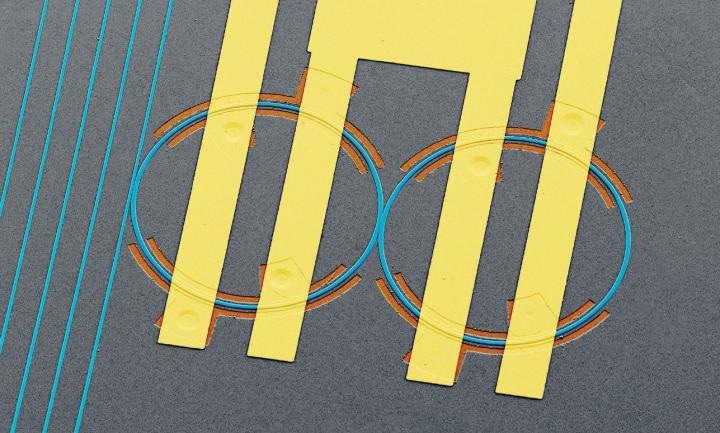Jan 9 2019
An innovative integrated photonics platform has been created by scientists at the Harvard John A. Paulson School of Engineering and Applied Sciences (SEAS). The platform can store light and electrically control its frequency, or color, in an integrated circuit.
 A new integrated photonics platform that can store light and electrically control its frequency (or color) in an integrated circuit. (Image credit: Loncar Lab/HarvardSEAS)
A new integrated photonics platform that can store light and electrically control its frequency (or color) in an integrated circuit. (Image credit: Loncar Lab/HarvardSEAS)
The platform is developed based on atomic systems and could find a broad array of applications, such as optical signal processing, photonic quantum information processing, and microwave photonics.
This is the first time that microwaves have been used to shift the frequency of light in a programmable manner on a chip. Many quantum photonic and classical optics applications require shifting of optical frequencies, which has been difficult. We show that not only can we change the frequency in a controllable manner, but using this new ability we can also store and retrieve light on demand, which has not been possible before.
Mian Zhang, CEO, HyperLight Corporation.
Mian Zhang is a former postdoctoral fellow in Applied Physics at SEAS. At present, he is the CEO of Harvard-spawned startup HyperLight Corporation. He is also the first author of the study.
The study was reported in the Nature Photonics journal.
Although microwave signals are extensively used in wireless communications, scientists considered them to interact too weakly with photons. This was the scenario before SEAS researchers, headed by Marko Loncar, the Tiantsai Lin Professor of Electrical Engineering, created a method for fabricating high-performance optical microstructures from lithium niobate, a material that has robust electro-optic properties.
Earlier, Loncar and his colleagues showed that light can be propagated through lithium niobate nanowaveguides with very little loss, thereby controlling light intensity using on-chip lithium niobate modulators. In the most recent study, the researchers integrated and further developed these technologies to develop a molecule-like system and used the new platform to achieve precise control the phase and frequency of light on a chip.
The unique properties of lithium niobate, with its low optical loss and strong electro-optic nonlinearity, give us dynamic control of light in a programmable electro-optic system. This could lead to the development of programmable filters for optical and microwave signal processing and will find applications in radio astronomy, radar technology, and more.
Cheng Wang, Assistant Professor, City University of Hong Kong.
Cheng Wang is the co-first author of the study.
As the next step, the goal of the scientists is to build optical waveguides and microwave circuits with an even lower loss with the help of the same architecture to allow even higher efficiencies and, eventually, accomplish a quantum link between optical and microwave photons.
The energies of microwave and optical photons differ by five orders of magnitude, but our system could possibly bridge this gap with almost 100 percent efficiency, one photon at a time. This would enable the realization of a quantum cloud—a distributed network of quantum computers connected via secure optical communication channels.
Marko Loncar, Tiantsai Lin Professor of Electrical Engineering, Harvard SEAS.
Loncar is the senior author of the study.
The study was also co-authored by Yaowen Hu, Amirhassan Shams-Ansari, and Tianhao Ren from the Laboratory for Nanoscale Optics at Harvard; and Shanhui Fan, Professor of Electrical Engineering at Stanford University. It was supported in part by the National Science Foundation, the Office of Naval Research, the Army Research Laboratory Center for Distributed Quantum Information, and the Center for Integrated Quantum Materials (CIQM). Device fabrication was carried out at the Center for Nanoscale Systems at Harvard University.